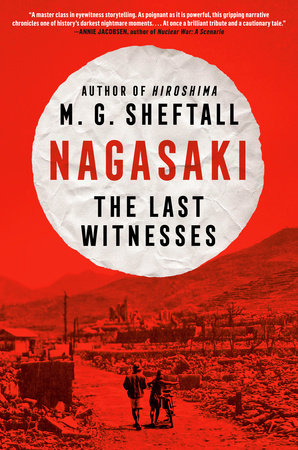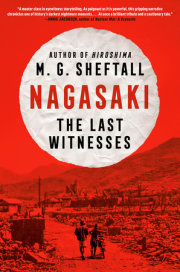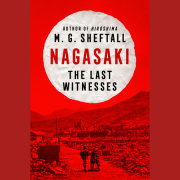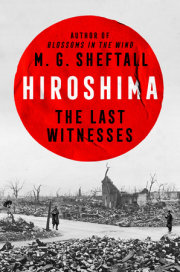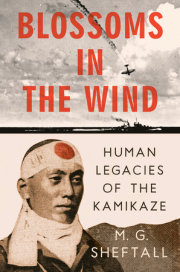"There Are No Civilians in Japan"
Tinian Island
0030 hours, August 8, 1945
Thirty-three hours after its roaring return to North Field, Enola Gay sat empty and crypt quiet on its macadam hardstand, the whirring movie cameras and cheering crowds of its August 6 mission-accomplished celebrations long since replaced by the ambient buzz of insects and the occasional passing sentry jeep.
Twenty-five hundred kilometers to the northwest, in the harbor city of Nagasaki, sixteen-year-old Gunge Norio was walking home after working a night shift at a Mitsubishi ordnance plant. Roughly two kilometers southeast of this factory, in Nagasaki's central business district, two of Norio's Mitsubishi coworkers, fifteen-year-old Kiridōshi Michiko and fourteen-year-old Ishida Masako, were catching their last few precious hours of sleep ahead of another day shift of thankless toil for Japan's rapidly collapsing war effort. So was thirteen-year-old Tateno Sueko, who, later that morning, would be helping to dig bomb shelters with other members of her neighborhood association.
In the northern Nagasaki suburb of Urakami, a twenty-one-year-old Catholic novice named Itonaga Yoshi would soon rouse in her convent room for Matins prayers with her fellow Sisters in the chapel of Junshin Girls' School.
Around and amongst these five adolescents, forty thousand men, women, and children were a few hours away from waking up to the last full day of their lives.
Across the Sea of Japan from Nagasaki, Kiridōshi Michiko's uncle, Tetsurō, was one of the million-odd soldiers defending the northwestern frontier of Japanese-occupied Manchuria. Along the border of this territory, the Red Army was using the cover of darkness to move more than five thousand tanks, twenty-six thousand artillery pieces, and 1.5 million men into final jumping-off points. Thirty minutes later, these forces would spring into action, fulfilling Joseph Stalin's Yalta Conference promise to Franklin Roosevelt and Winston Churchill that the Soviet Union would officially join the war against Japan three months to the day after the capitulation of Nazi Germany.
Four thousand kilometers southeast of Stalin's massing armor, and a few hundred meters from Enola Gay's hardstand, scientists and engineers from the Manhattan Project's "Project Alberta" technical team were pulling an all-nighter in a purpose-built air-conditioned assembly shed. Here, they were readying a second atomic bomb-a "Fat Man" (so called because of its rotund shape) plutonium device of the same type first ground-tested in the New Mexico desert barely three weeks previously. In a little more than twenty-four hours, this second Fat Man would be dropped from a B-29 on a Japanese city-either Nagasaki or the arsenal town of Kokura. While the "sure thing" and technologically much simpler one-off uranium device that had been dropped on Hiroshima had gone off, as expected, without a hitch, none of the Project Alberta team members were as confident about the odds of this far more complex and mechanically sensitive Fat Man device functioning as designed in the inherently chaotic conditions of a combat mission. Moreover, the probability of malfunction was further increased as the technicians were being forced to race against the clock; the second atomic strike was being timed to take advantage of the last remnants of a patch of favorable weather over the target area of western Japan. After August 9, skies in this region were forecast to be socked in by clouds.
In a strictly technical sense, the weather situation was not insurmountable for an all-weather bomber like the B-29. If necessary, the second mission strike force could drop its ordnance by radar, as per standard operating procedure for B-29s encountering inclement conditions during a conventional mission. But deployment of the atomic bombs came with a set of special rules: According to the field orders the 509th Composite Group had received from Twentieth Air Force, the atomic bomb was only to be dropped when its target could be clearly visibly identified, and there were no mission parameters in the orders for radar-drop scenarios. If the August 9 window of good drop weather were missed, it would be nearly a week until the weather cleared enough for the 509th to get its next chance to drop a visually aimed second atomic bomb on Japan.
The Americans' meteorological urgency was a direct consequence of the strategic imperative to exploit the psychological shock value of Hiroshima. It was hoped that dropping a second bomb so soon after the first would lead the Japanese to believe that there were many more of these weapons in the American arsenal than there actually were, and that these would continue to be dropped on Japan until that country either surrendered or-as per Harry Truman's July 26 Potsdam Declaration threat (which the Japanese so far were refusing to acknowledge)-ceased to exist. To ramp up the political and psychological pressure on Japan's national leadership, as well as its general populace, Twentieth Air Force B-29s-in between incendiary raids-had been dropping over Japanese cities in the wake of the Hiroshima bombing leaflets featuring a photo of Little Boy's mushroom cloud and bearing the following message translated into Japanese:
TO THE JAPANESE PEOPLE:
America asks that you take immediate heed of
what we say on this leaflet.
We are in possession of the most destructive explosive ever devised by man. A single one of our newly developed atomic bombs is actually the equivalent in explosive power to what 2,000 of our giant B-29's can carry on a single mission. This awful fact is one for you to ponder and we solemnly assure you it is grimly accurate.
We have just begun to use this weapon against your homeland. If you still have any doubt, make inquiry as to what happened to Hiroshima when just one atomic bomb fell on that city.
Before using this bomb to destroy every resource of the military by which they are prolonging this useless war, we ask that you now petition the Emperor to end the war. Our President has outlined for you the thirteen consequences of an honorable surrender: We urge that you accept these consequences and begin the work of building a new, better, and peace-loving Japan.
You should take steps now to cease military resistance. Otherwise, we shall resolutely employ this bomb and all our other superior weapons to promptly and forcefully end the war.
EVACUATE YOUR CITIES
But even if the Americans' bombing schedule were met, and despite these air-dropped appeals to popular fear, there was still a possibility that the second bombing would prove as unconvincing to the Japanese leadership as the first apparently had been. In this case, the unlimited-bombs bluff would lose its teeth (assuming it had ever had any in the first place) long before a third bomb became available, which would be some time around August 19 to 21. A lot could happen in ten to twelve days when an autocratic regime was facing an existential threat; exploiting this downtime, militarist hard-liners with access to the imperial throne might convince His Majesty that this new atomic wrinkle in the war situation-horrific as it was-was endurable in lieu of the unthinkable alternative of surrender, occupation, and the potential end of Japan's twenty-six-hundred-year-old imperial dynasty.
As a matter of military prudence, the Americans could not dismiss out of hand official crowings that had featured center stage in Japanese propaganda content since the fall of Saipan a year earlier about possessing the ultimate strategic weapon of a populace that was prepared to die en masse in a final decisive battle-a so-called hondo kessen-to defend its homeland rather than dishonor it with surrender. Until the Americans began hitting the invasion beaches of Kyushu later that fall, they would not know if all of this Japanese talk about "a hundred million balls of fire" and flaming mass suicide was a sincere declaration of national resolve or mere propaganda bluster.
The Americans, then, were not the only players in this strategic standoff in which bluff and resolve were indistinguishable. The Japanese played their hand by raising in the American imagination the specter of a ground-combat and kamikaze-plane apocalypse that, if the Americans went ahead with their plans for a land invasion of the Home Islands, could have been akin in degree of ferocity to the bloodbath the Allies had just endured on Okinawa (where they had suffered some fifty thousand casualties and up to twice as many Japanese civilians might have perished), but potentially multiplied by orders of magnitude in terms of scale. The Japanese aim here was to get the Americans to blink first and cut a peace deal more generous than the unconditional surrender they had been demanding since the Casablanca Conference of January 1943. In the early days of August 1945, Emperor Hirohito and his most trusted advisors-unaware not only of what was about to happen in Manchuria, but also of what the Soviet leader had promised in Yalta six months earlier-held out pipe-dream hopes that the still technically Japan-neutral Stalin might help to broker such a deal.
In what can only be considered either a gross lapse of foresight or a fatal case of wishful thinking, no one at the highest levels of strategic decision-making in Tokyo seems to have advised the emperor-the only person in Japan capable of ordering an end to the war-of the possibility that a solemnly sworn threat of imminent Armageddon, rather than halting in its tracks the American juggernaut then headed for the Home Islands, might instead spur that enemy to deploy ever more effective means of indiscriminately slaughtering Japanese soldiers and civilians in their millions.
Although American field commanders at the in-theater operational level were contemplating using a third atomic bomb on Tokyo, higher-echelon decision-makers in Washington were coming around to the idea that there would be little strategic value in dropping another very expensive bomb just to rearrange the rubble in the imperial capital and kill another hundred thousand or more civilians, especially if the hearts of Japan's leaders were already inured to such sacrifice. Instead, the third bomb and the rest of the next production run of plutonium Fat Man devices could be put to better use as tactical battlefield weapons for the upcoming invasion of Kyushu, prepping the landing sites and neutralizing Japanese command and logistic centers farther inland when the Allies began hitting the beaches there on November 1, by which time, General Leslie R. Groves assured Washington, the Manhattan Project organization would have ten or more such devices ready to go.
In the meantime, the Allies would press on with their systematic dismantling of Japan's economy and infrastructure by conventional means and spare no collateral damage in the process. A passage from an official intelligence briefing for the Fifth Air Force succinctly encapsulated the operant mindset of this strategy:
[T]he entire population of Japan is a proper Military Target. . . . THERE ARE NO CIVILIANS IN JAPAN. We are making War and making it in the all-out fashion which saves American lives, shortens the agony which War is and seeks to bring about an enduring Peace. We intend to seek out and destroy the enemy wherever he or she is, in the greatest possible numbers, in the shortest possible time.
Toward this end, the country's sea-lanes, harbors, and inland waterways would continue to be blockaded and strangled by submarines, aerial mining ("Operation STARVATION"), and air attack. The Far East Air Forces (FEAF) would hit tactical targets and immobilize the national railway network-an effort that would interdict enemy troop and supply movement as well as prevent the vitally important autumn rice harvest from reaching the main population centers on the Tokyo-Osaka urban corridor, a development that would result in mass famine in the Home Islands by year's end.
Finally, Major General Curtis E. LeMay's XXI Bomber Command (XXI BC) would continue its incendiary campaign against urban areas and war industries, steadily increasing the size and frequency of its raids until there was nothing left to burn down. And if LeMay's B-29s left anything standing in the embers, the FEAF could swoop in afterward to bomb and strafe it.
Outside of the barbed wire fencing of the 509th Composite Group's heavily guarded section of North Field, the 313th Bombardment Wing, XXI BC, was taking a prominent role in this agenda of destruction, busily preparing to help erase another line entry from the Twentieth Air Force's ever-dwindling target list of Japanese cities. But unlike its secretive North Field neighbors, the 313th did not possess the ability to wipe out one of these targets in a blink with a single bomb. Instead, like the other four wings in LeMay's command, it waged its war by dropping thousands of tons of incendiaries and high explosives on Japanese urban and industrial concentrations every week or, in the case of maximum-effort outings like the great fire raids on Tokyo, sometimes even in a single night.
Five months earlier, LeMay had begun this blitz by switching XXI BC's main tactic from daytime bombing of war plants to the incendiary-saturation "area" bombing of urban concentrations by night, as Britain's Royal Air Force had used to such great effect against Germany. Since then, his B-29s had killed 300,000 civilians and "dehoused" some 30 percent of the Japanese population by either completely or partially burning down sixty-seven cities.
Sustaining a campaign of such intensity and scale necessitated the creation of a dedicated global supply chain worthy of a giant multinational corporation. Sitting at the pinnacle of this organizational pyramid was management, housed in the Guam headquarters of XXI BC. Here, a small army of uniformed Ivy League MBAs (including a young statistician on loan from Harvard named Robert S. McNamara) used cutting-edge 1940s IT and scientific business theory to decide how much product would go out for each mission, when and where it would be delivered, and how much inventory had to be ordered from Stateside factories to sustain this incendiary momentum.
Doing the heaviest logistical lifting for this enterprise, volume- and distance-wise, was an effectively proprietary merchant marine fleet that ferried product from manufacturers like Standard Oil of New Jersey and Permanente Metals across some ninety-five hundred kilometers of the Pacific Ocean to reach Guam and the other B-29 bases on the Mariana islands of Saipan and Tinian.
Ensuring these bases operated smoothly was an in-theater maintenance and logistical apparatus of mind-boggling complexity. This enterprise employed (and fed, housed, and clothed) thousands of engine mechanics, radar technicians, armorers, and other specialists who toiled around the clock in machine shops, warehouses, fuel tank farms, and bomb dumps.
Finally, there were the thousands of young men-typically eleven crewmen to each B-29-tasked with delivering product on time and on target. Operations at this end point typically incurred an overhead cost-due to some combination of enemy action, mechanical malfunction, and pilot error-of perhaps twenty planes a week during slow periods and more during maximum-effort phases.
Copyright © 2025 by M. G. Sheftall. All rights reserved. No part of this excerpt may be reproduced or reprinted without permission in writing from the publisher.

